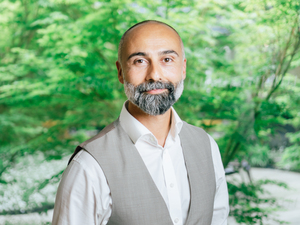Elevating Everyday Leadership: The Power of Team Coaching


A high-performing team that is delivering exceptional results most likely has a leader who took the time to stop and listen to its members, says Naysan Firoozmand, global head of coaching at corporate education provider Hult EF.
Adopting a team-coaching approach, rather than leading through command and control, empowers employees, enabling them to generate their own solutions to business challenges, Firoozmand told From Day One’s May virtual conference in a thought leadership spotlight on the power of adopting team-coaching skills. “The team needs to be able to express their thoughts and ideas and ultimately take ownership of the solutions that they come up with, often leading to longer-term success, and increased psychological safety and well-being within the teams,” said Firoozmand.
Team coaching, he said, develops communication and collaboration capabilities–two of the top skills that employers want today. “People will be equipped with the communication and leadership skills that won’t be superseded by the latest technology,” said Firoozmand, who has been working in the field of leadership development and behavior change for nearly two decades.
The team approach differs from one-to-one coaching. Instead, managers focus on working with the group as a whole to unlock collective awareness and capabilities. Team coaching helps employees develop better ways of collaborating to deal with stress, eliminate ambiguity, and identify the group’s strengths and weaknesses, Firoozmand said. “There is a pivotal role around trust, enabling openness, and embedding an open dialogue,” he said. Managers with team-coaching skills, he noted, “know when listening is the answer.”

A team that is listened to feels significant and more competent, while suspending judgment allows ideas and dialogue to flow. Creating a safe and trusted environment where employees feel comfortable generating new ideas without fear of encountering an unhelpful critical voice is called ideational fluency, said Firoozmand.
“Have any of you experienced hearing your own words out loud and realizing how different it sounds compared to when it was just sitting in your head? This is a necessary component of the team’s development, realizing what a terrible idea sounds like, but equally, what value an idea has to the team,” he told the audience.
Asking questions is an inevitable part of what a manager who is using coaching skills will do, Firoozmand said. When asking questions, the purpose should be to fuel the curiosity within the team and explore ideas, rather than to gather information. “It’s thinking about the purpose behind the questions. The last thing you want to do is become a facilitator of the group. This is not the same thing as coaching the team,” he said.
And while it’s often perceived as quicker and easier to answer each question from your team, resist that temptation, Firoozmand cautioned. “When the question comes many times from each member of the team, you need to listen to not only what is being said, but how and why,” he said.
A business culture centered around learning and development will naturally foster workers who embrace progression and are receptive to new ideas, and this ultimately benefits the organization, said Firoozmand. When a coach can notice the subtle dynamics of what's going on in the team, it can be “incredibly powerful,” he said. “It’s really important that they get to know the individuals, so that they have an understanding of the nuances of individual contribution,” he said.
Likewise, managers benefit from team-coaching efforts because they gain a skill set that will enhance their leadership and communication capabilities, as well as improve their ability to notice things across the organization that will help them to influence change. “Organizational change is rooted in behavior change,” he emphasized.
If it’s time for the team to be doing something differently, then coaching is needed, Firoozmand said. “Quite often, the precursor to being able to do things differently is having the willingness to think things through in a way that you haven’t thought about before. It’s not about learning a new skill or a new piece of knowledge. It’s having a sparring partner, somebody who’s able to hold you to account, hold up the mirror and say, ‘Do you realize what you're doing and how you're doing it, and how that’s impacting both yourself and others?’ And for the person to be able to go, ‘I never really saw that. That’s really interesting,’” he said.
Editor’s note: From Day One thanks our partner, Hult EF, for sponsoring this thought leadership spotlight.
Susan Kelly is a Chicago-based business journalist.
(Featured photo by PeopleImages/iStock by Getty Images)
The From Day One Newsletter is a monthly roundup of articles, features, and editorials on innovative ways for companies to forge stronger relationships with their employees, customers, and communities.